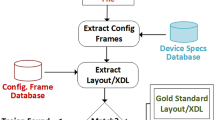Abstract
Programmable logic is widely used, for applications ranging from field-upgradable subsystems to advanced uses such as reconfigurable computing platforms. Users can thus implement algorithms which are largely executed by a general-purpose CPU, but may be selectively accelerated with special purpose hardware. In this paper, we show that programmable logic devices unfortunately open another avenue for malicious users to implement the hardware analogue of a computer virus. We begin with an outline of the general properties of FPGAs that create risks. We then explain how to exploit these risks, and demonstrate through experiments that they are exploitable even in the absence of detailed layout information. We prove our point by demonstrating the first known FPGA virus and its effect on the current absorbed by the device, namely that the device is destroyed. We close by outlining possible methods of defense and point out the similarities and differences between FPGA and software viruses.
This work was supported by DARPA under Contracts #DABT63-95-C-0073, #N66001-96-C-852 and #MDA972-95-1-0013, with additional support from the Hewlett-Packard and Intel Corporations.
Access this chapter
Tax calculation will be finalised at checkout
Purchases are for personal use only
Preview
Unable to display preview. Download preview PDF.
Similar content being viewed by others
References
Allke, P.: Configuration Issues: Power-up, Volatility, Security, Battery Back-up. Xilinx Inc., Application Note 092, Version 1.1 (November 1997)
Altera, Corporation. Altera Device Package Information - Data Sheet, 7 edn. (March 1998)
Altera, Corporation. Flex 8000 Programmable Logic Family - Data Sheet, 9.11 edition (September 1998)
Annapolis Micro Systems Inc., Information on the Web, http://www.annapmicro.com
Arnold, J.M., Buell, D.A., Davis, E.G.: Splash 2. In: Proceedings of the 4th Annual ACM Symposium on Parallel Algorithms and Architectures, June 1992, pp. 316–324 (1992)
Borriello, B., et al.: The Triptych FPGA architecture. IEEE Transactions on VLSI Systems 3(4), 491–501 (1995)
Cohen, F.: Computer Viruses, Theory and Experiments. Computers and Security 6, 22–35 (1987)
Graham, P., Nelson, B.: A Hardware Genetic Algorithm for the Traveling Salesman Problem on SPLASH 2. In: Proceedings of FPL 1995, September 1995, pp. 352–361 (1995)
Burns, J., et al.: A Dynamic Reconfiguration Run-Time System. In: Proceedings of FCCM 1997 (April 1997)
Lechner, E., Guccione, S.A.: The Java Environment of Reconfigurable Computing. In: Proceedings of FPL 1997, September 1997, pp. 284–293 (1997)
McGregor, G., Robinson, D., Lysaght, P.: A Hardware/Software Co-design Environment for Reconfigurable Logic Systems. In: Proceedings of FPL 1998, September 1998, pp. 258–267 (1998)
Mackinlay., P.I., et al.: Riley-2: A Flexible Platform for Codesign and Dynamic Reconfigurable Computing Research. In: Proceedings FPL 1997, September 1997, pp. 91–100 (1997)
Shanley, T., Anderson, D.: PCI System Architecture, 3rd edn. Addison Wesley, Reading (1995)
Smith, D., Bhatia, D.: Race: Reconfigurable and adaptive computing environment. In: Proceedings of FPL 1996 (September 1996)
Virtual Computer Corporation. Information on the Web, http://www.vcc.com
Mangione-Smith, W.H., et al.: Seeking Solutions in Configurable Computing. IEEE Computer Magazine, 38–43 (December 1997)
Zetex Semiconductors Current Sensors, http://www.zetex.com/sensors.htm
Author information
Authors and Affiliations
Editor information
Editors and Affiliations
Rights and permissions
Copyright information
© 1999 Springer-Verlag Berlin Heidelberg
About this paper
Cite this paper
Hadžić, I., Udani, S., Smith, J.M. (1999). FPGA Viruses. In: Lysaght, P., Irvine, J., Hartenstein, R. (eds) Field Programmable Logic and Applications. FPL 1999. Lecture Notes in Computer Science, vol 1673. Springer, Berlin, Heidelberg. https://doi.org/10.1007/978-3-540-48302-1_30
Download citation
DOI: https://doi.org/10.1007/978-3-540-48302-1_30
Publisher Name: Springer, Berlin, Heidelberg
Print ISBN: 978-3-540-66457-4
Online ISBN: 978-3-540-48302-1
eBook Packages: Springer Book Archive




